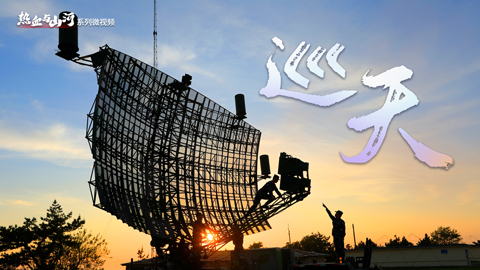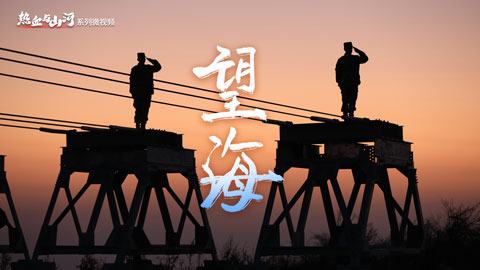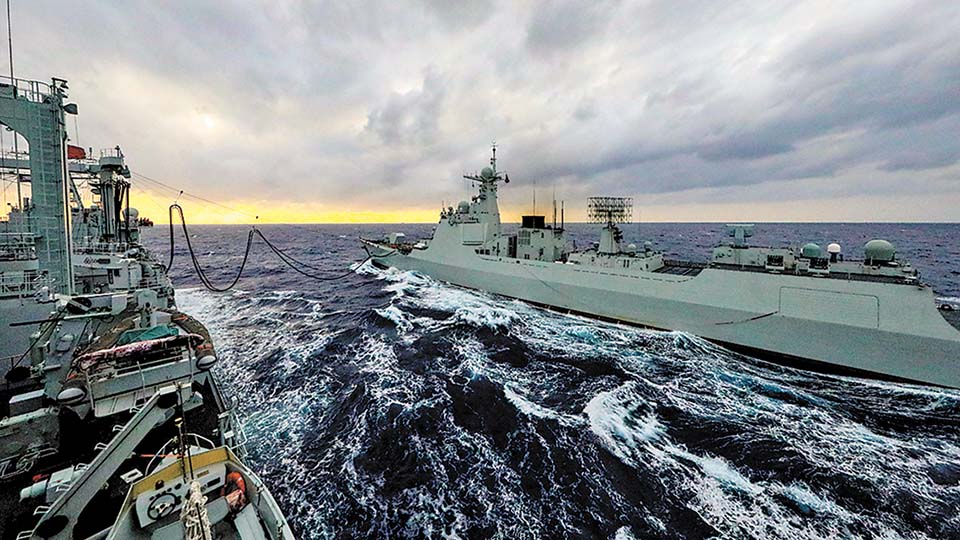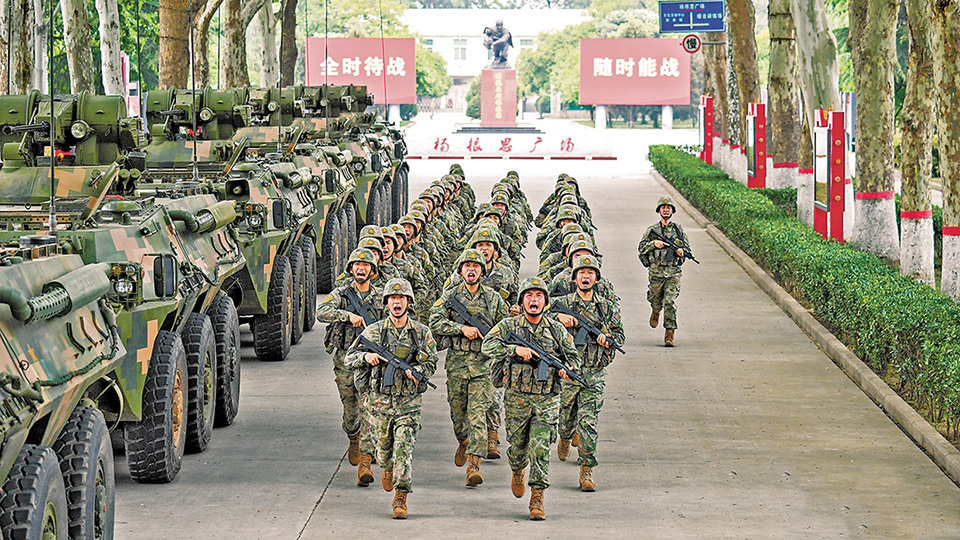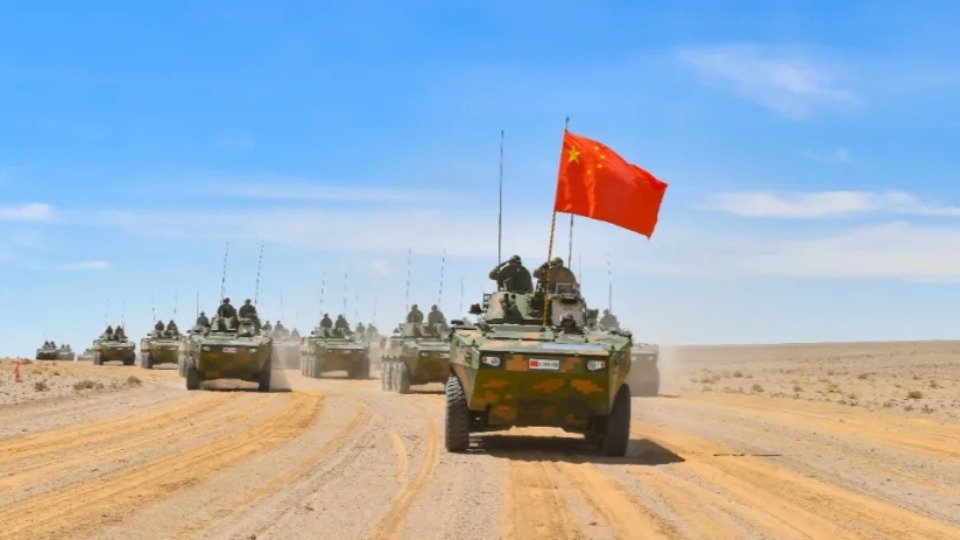
High-rises dominate the skyline on both sides of the Huangpu River in Shanghai. [Photo by Gao Erqiang/China Daily]
By Zhao Huirong
China has announced it will not participate in the Summit on Peace in Ukraine to be held in Switzerland on Saturday and Sunday, because to broker peace both parties to a conflict need to be present at the negotiation table but the organizers have not invited Russia to the summit. Yet, instead of criticizing the organizers for their mistake and bias, some Western politicians and observers claim China is not attending the summit because it stands with Russia and does not want the conflict to end.
In response, Foreign Ministry spokesperson Mao Ning said on June 3 that China attaches great importance to the "peace meeting" in Switzerland and has been in close contact with Switzerland, Ukraine and other countries, but has repeatedly stressed that the peace summit needs to meet three important elements — recognition from both Russia and Ukraine, equal participation of all parties, and fair discussion on all peace plans. Since the meeting does not seem to satisfy these three requirements, China has decided to stay away from it.
First, China's stance on the Russia-Ukraine conflict has been consistent and transparent. It remains committed to promoting peace talks, and has made its stance on the issue clear in a document, titled "China's Position on the Political Settlement of the Ukraine Crisis", which was released in February 2023. China believes that in any conflict, third parties can only communicate with the conflicting parties to help deescalate the situation and reach a cease-fire. But only the conflicting parties can agree to a cease-fire.
Without Russia being present, the summit cannot help restore peace. It appears the summit has been unilaterally initiated by Ukraine in the hope of forging a united front in support of Ukrainian President Volodymyr Zelensky's peace plan and isolating Russia. The aim of his 10-point peace plan is to regain territory and punish Russia.
However, without the mandate to declare a cease-fire, the summit, the fifth initiated by Ukraine, will end up being another talking shop. Hence, China refuses to take part in the summit.
Western support, both material and political, has boosted Ukraine's confidence that it can defeat Russia through military means. And China's participation in the meeting will not be enough to persuade the Ukrainian leadership to seek a peaceful resolution to the conflict.
Among the previous four meetings on the Ukraine crisis, China's Special Representative on Eurasian Affairs Li Hui attended the one in Jeddah last year. He also carried out a third round of shuttle diplomacy in May to seek a political resolution to the Ukraine crisis. However, Kyiv refuses to withdraw or amend its decree which rules out talks with Moscow as long as President Vladimir Putin remains at the helm of Russian affairs.
Although many countries kept calling for peace talks till December 2023, when many considered Ukraine's counteroffensive to have failed and US Congress refused to approve more aid for Ukraine, such calls have rarely been heard this year. In fact, some Western countries have signed security agreements with Ukraine and are gradually easing their restrictions which prevented Ukraine from using Western-supplied weapons against Russia, further raising tensions.
China is working to create a peaceful international environment so it can pursue high-quality development. Yet some Western countries and Ukrainian politicians have been questioning China's neutral stance, because they want China to toe their line. They are even trying to interfere in China's internal affairs in order to compel it to adhere to their policies.
In such circumstances, if China attends the meeting in Switzerland and insists on remaining neutral, one can imagine how fierce the Western powers' reaction will be.
China believes that all countries are equal regardless of their size and national strength. Therefore, it is regrettable that Zelensky talked negatively about Sino-Ukrainian relations at the Shangri-La Dialogue in Singapore on June 2.
Foreign Ministry spokesperson Mao Ning has made it clear that not attending the peace meeting does not mean not supporting peace. As an independent and responsible major country, China's decision on whether to attend the meeting is based on its own judgment, and it will not be swayed by the likes and dislikes of other countries.
During his meeting with Ukrainian First Deputy Foreign Minister Andrii Sybiha in Beijing on June 5, Vice-Foreign Minister Sun Weidong said that in the 32 years since the establishment of Sino-Ukrainian diplomatic relations, overall bilateral ties have developed steadily. China is willing to work with Ukraine to implement the important consensuses the two countries have reached and carry forward the fine tradition of mutual respect, Sun said. And calling for the promotion of bilateral exchanges and cooperation in various fields, Sun urged that efforts be made to safeguard Sino-Ukrainian relations.
The Russia-Ukraine conflict has claimed thousands of lives and caused extensive economic losses on both sides. This is exactly what China means when it stresses there are no winners in a conflict, and lasting peace cannot be established through military power.
Besides, according to the six common understandings China and Brazil reached on May 23, the international community should help find a political solution to the Ukraine crisis. Also, Beijing and Brasilia believe dialogue and negotiation are the only viable way of resolving the Ukraine crisis, and the two countries are making great efforts to provide increased humanitarian assistance for people caught in the conflict in a bid to prevent a greater humanitarian crisis. China and Brazil are also strongly opposed to the use of weapons of mass destruction, particularly nuclear, chemical and biological weapons.
Since the China-Brazil six-point consensus meets the expectations of most countries, China has been urging more countries to support it and persuade Russia and Ukraine to peacefully resolve their differences. In the meantime, China will continue to promote peace talks and conduct shuttle diplomacy in order to help restore peace in Ukraine.
The author is a researcher at the Institute of Russian, Eastern European and Central Asian Studies, Chinese Academy of Social Sciences.









